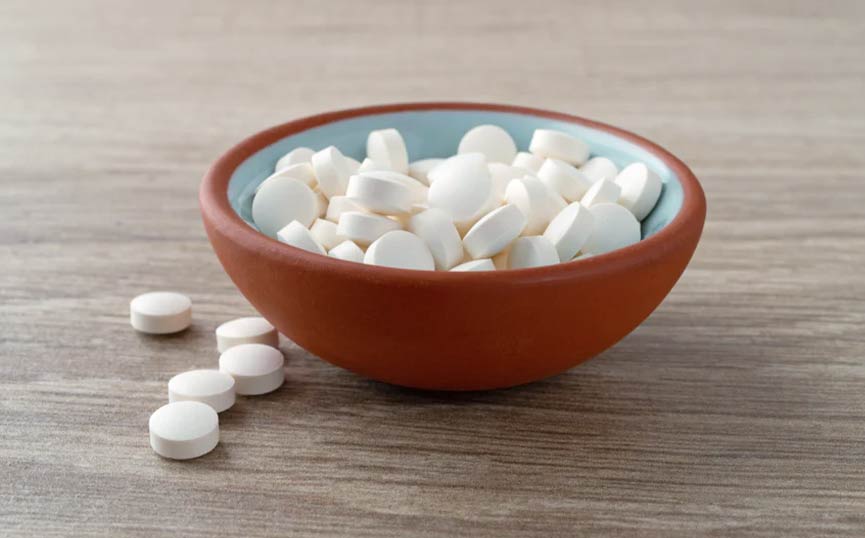Here's what you need to know about the effects and risks of DHEA!
DHEA - this acronym may be familiar to those who are a little more at home in bodybuilding or more serious about sports. Dehydroepiandrosterone is a prohormone that is naturally produced by the body, but it is also commonly used as a dietary supplement to increase muscle mass and increase longevity. However, in addition to its many benefits, it is important to know the risks before using it regularly. What should we know about this hormone before using it? How does normal, overweight and underweight affect our bodies? Read our article to find out more!

What should you know about DHEA?
The bodybuilding parent hormone - or what exactly is DHEA?
Although it may first come to mind in the minds of bodybuilders - as it plays a role in more than 150 metabolic functions - DHEA is actually a hormone produced by both men and women, and in very high quantities. The adrenal glands and, in men, the testicles produce a lot of it. The DHEA produced is then converted into androstenedione and a few other sex hormones - hence the name 'birth hormone'.
Dehydroepiandrosterone is a natural anabolic steroid: it helps to build lean muscle mass and set optimal fat levels. For this reason, it is recognised as an active ingredient in capsules by bodybuilders and athletes alike. But DHEA's effect goes beyond optimising your weight. It positively affects our heart health, bone density, cholesterol regulation, increases testosterone and estrogen levels, and the components of our body. DHEA's importance lies precisely in its versatile role: as an anti-ageing anti-stress hormone, it can directly increase our lifespan.
How the amount of hormone changes with age
Our bodies produce DHEA at maximum levels until we are 20-25 years old. After that, however, it decreases by 2% per year, which means that by the age of 40, our bodies produce half as much and by the age of 75, our bodies produce only 10-20% of what they used to. This can cause a number of problems, including weight gain, heart problems and lower libido. Women are particularly at risk of DHEA deficiency - their bodies produce only 80-90% of the DHEA levels of men.
The 8+1 effects of DHEA on your body
1. Anti-inflammatory
The vast majority of diseases are based on inflammation - such as arthritis, autoimmune diseases, lupus, and metabolic syndrome (a complex set of metabolic symptoms associated with obesity, high blood pressure and cholesterol, and diabetes). Research in this direction has shown that people with these problems also have low levels of DHEA. But for those who started supplementing with the hormone, their inflammation decreased and their hormonal systems became more balanced.
2. Against mood swings and cognitive decline
In a 2014 study, DHEA was found to be very beneficial for people with schizophrenia, depression and anorexia nervosa, as well as for people with adrenal insufficiency and HIV-positive people. But its benefits go even further: it can also slow the cognitive decline that often accompanies ageing and Alzheimer's disease. It can keep your memory fresh even in old age.
3. Helps to increase muscle mass
By increasing testosterone production, it also increases muscle strength - so DHEA can be used to make bulking workouts more effective (although it does not increase muscle mass on its own).
4. The main supporter of our weight loss
It also supports our athletic training at the level of fat loss. The DHEA hormone 7-Keto helps your body use energy more efficiently (by using glucose), preventing fat deposits that increase with age. This can help keep our metabolism functioning at a high level as we get older.
5. Can improve bone density
There is no need to fear osteoporosis or bone fractures if you keep your DHEA hormone levels in the right range. This hormone has anti-ageing properties that improve the production of oestrogen, which in turn improves the mineral content of our bones. So older women in the post-menopausal period can particularly benefit from taking it regularly. And rheumatic pains can be completely eliminated.
6. Libido enhancer
When DHEA is taken, it is converted into the hormones we need most at the moment: testosterone in men, progesterone or oestrogen in women, which play a big role in our sex drive. In women, taking just 10-25 mg a day helps reduce vaginal dryness, menopausal symptoms and weight gain. It is also proven to be helpful for men suffering from erectile dysfunction, impotence: research has shown that taking DHEA for six months can reduce erectile problems. Due to its beneficial properties, both sexes may benefit from taking it as a supplement if they are experiencing problems in their sex life, such as loss of libido.
7. Reduces the risk of heart disease and diabetes
By stimulating the function of blood vessels, it helps prevent blood clots, blocked arteries, high cholesterol - and therefore heart problems. And by reducing inflammation and improving the use of glucose and insulin, it significantly reduces the risk of diabetes. It can also greatly reduce the chance of developing cancer.
8. Slows down the ageing of our skin
After the menopause, DHEA levels in the female body drop by 90% - so our skin loses its youthful, ashy appearance. However, our metabolism can be "reprogrammed" to look youthful by taking DHEA: its anti-ageing, anti-aging benefits are also reflected in our skin. This hormone has the effect of "preserving" our youth: it can reduce age spots and eliminate yellowing of the skin. It also helps to reduce wrinkles by improving skin hydration and sebum function, and activating markers of youthful skin (such as keratinocytes). On top of this, it can also improve the condition of our nails and thicken our hair.
+1. Immune booster
You can even boost your immune system by using DHEA, which also increases the number of immune cells.

What are the symptoms of DHEA deficiency?
What are normal, low and high DHEA levels?
Although reference ranges for DHEA levels may vary between laboratories, sex and age, the average normal range is 4.5-41.6 nmol/l. If your DHEA-S (dehydroepiandrosterone sulphate) is normal and your levels of other androgenic hormones are normal, in most cases you can rest assured that your adrenal glands are functioning normally. (But even then, in rare cases, you may still have an adrenal tumour, in which case you may not be secreting hormones.)
If DHEA-S levels are high, it may indicate:
- PCOS (polycystic ovary syndrome)
- hyperplasia
- adrenal cancer or adrenal tumours
If it is lower than the reference value, it can cause:
- reduced pituitary gland function (due to reduced pituitary hormone levels)
- adrenal gland dysfunction
However, it is important not to draw conclusions from variations in DHEA levels alone: a combination of several other values is needed to suspect any underlying disease. Therefore, we should always ask our doctor for help in interpreting the test results.
What are the symptoms of DHEA deficiency?
One of the most important symptoms of low DHEA levels is that it accelerates the ageing process in the body, increasing the risk of many diseases (coronary artery atherosclerosis, cancer, osteoporosis, arteriosclerosis, diabetes). In its absence, our immune system is weakened, but fortunately, by replacing the hormone, we can reverse the damage.
What should you know about DHEA testing?
The test can tell us how our adrenal glands are functioning in our body. It is also worth considering for women who suffer from acne, lack of menstruation (amenorrhoea) or even excessive hair growth (hirsutism), as well as for young girls who are struggling with virilism (masculinity). In male children, however, there is only cause for concern if puberty appears very early.
The test itself is basically a blood test, and you don't need to do much preparation. However, as a woman, it is important to talk to your doctor about the time, as the blood test should be done a week before or after your period.
How can we supplement DHEA?
DHEA can only be supplemented as a dietary supplement in the form of pure capsules. Contrary to popular belief, Mexican yam does not contain DHEA, its extract is just the raw material for the pill - so you cannot get it naturally in food.
Side effects of excessive intake of DHEA
Why is it important to be aware of the risks of taking DHEA?
Mostly because DHEA is a very powerful hormone. It works in a completely different way to most supplements, minerals or other vitamins. It's important to get just enough DHEA in your body for what it needs. If we have too much of it in our bodies, it can upset our very delicate hormone balance - which can be a source of other serious problems.
What are the possible side effects of excess intake?
- Excessive hair growth (hirsutism): in girls and women, overweight can cause masculine body and facial hair growth
- Appearance of acne
- Psychotic symptoms and/or increased depression
- May increase addictions and feelings of stress
Safe to take in these doses
For women, the recommended daily intake is 25 mg after waking up in the morning. And for men, 50 mg divided in two: 25 mg in the morning and 25 mg before bedtime, as this is the best way to increase testosterone. This amount can be taken safely for two years.
When is it not recommended?
There are several situations where it may not be a good idea to take DHEA:
- if you have a history of breast or prostate cancer (DHEA also increases oestrogen and testosterone, which can trigger the recurrence of these diseases),
- if you suffer from anxiety, heart disease or diabetes,
- if you are breastfeeding or pregnant (destabilises the production of sex hormones),
- if you are under 30, because your body still produces enough of it,
- or if you are taking antidepressants, anti-seizure medications or mood stabilizers.
DHEA is an essential building block for our bodies - but like everything else, it's important to keep it in moderation. To avoid the risk of developing a deficiency or overdosing, it's important to stick to the recommended daily intake. However, if you use it consciously, you can be healthier, more dynamic and have a much better quality of life. It is important, however, to check with your doctor before using it.



